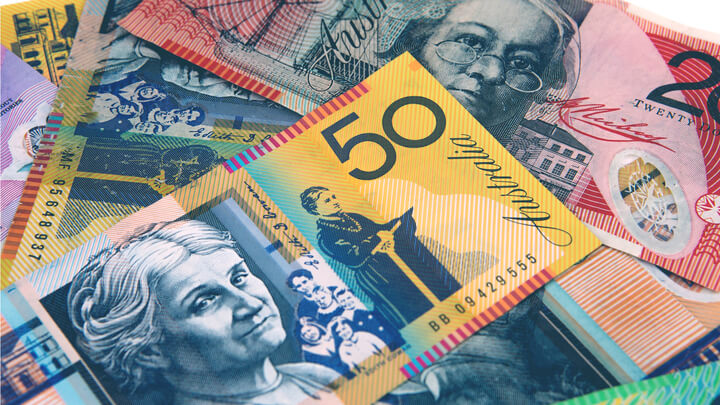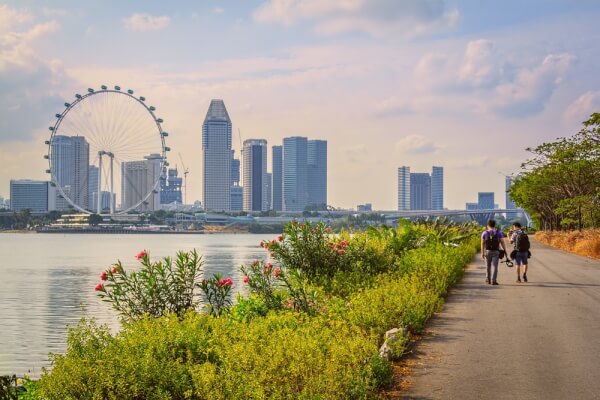ATMs in Singapore: Credit cards and fees
Singapore is a sovereign city-state, south of Malaysia, and just north of the equator - and a global hub for finance and trade. With a mixed and...

If you’re working, visiting, or investing in Singapore, you’ll want to be informed about money. Singapore is a global finance and business hub with The World Bank calling it the ‘easiest place to do business.
In this financial guide to Singapore, you’ll get an introduction to Singapore’s currency, exchange rates, and how to optimise your funds.
Singapore’s official currency is the Singapore dollar which is exchangeable with the Brunei dollar. That means you have good news if you have to make frequent trips to Brunei as the Singapore dollar is accepted in Brunei and vice versa.
| --- | --- |
| Names & Symbols | Dollar, SGD, S$, $, a dollar is sometimes called a ‘Sing’ |
| 1 SGD | The Singapore dollar is divided into 100 cents. |
| SGD coins | Singapore issues coins in 5, 10, 20, 50 cents, and $1. The 1 cent coin is rarely used and, while you may still find it in circulation, has not been issued since 2003. |
| SGD banknotes | Singapore prints banknotes in denominations of $2, $5, $10, $50, $100, $1000, and $10,000. The most common denominations currently being circulated are the $10, $50, and $100 notes. The $10,000 note is the world’s most valuable banknote still circulating. In 2014, Singapore stopped producing them and is now attempting to remove them from circulation. |
In order to get the best deal when you exchange your money from one currency to another, you’ll want to know about the interbank exchange rate (the real mid-market rate). The mid-market exchange rate is the rate between what global banks are buying and selling that currency on the international financial market. In other words, it’s the ‘truest’ exchange rate you’ll find.
If you’re looking to change some cash, it’s generally best to do so in Singapore at a major bank or ATM. If you’re planning on staying in the city, but are stuck in the Changi Airport and need Singapore dollars desperately, you may want to get just enough for transportation to your hotel (around S$50). Exchange rates at banks or exchange kiosks in the city are generally always better than at the airport.
Recommended places to exchange currency in Singapore include:
In People’s Park Complex, money exchangers are competitive and numerous, so you can compare rates while walking from one shop to the next.
In some cases, you may get the best exchange rate from your local bank before you leave for Singapore. Check with your home bank in advance to see how they can help. If you’re going straight from Changi Airport to a rural part of Singapore, it may save you money to exchange before you leave rather than at the airport or in a remote town.
While they’re not as common today as they once were, traveller’s cheques do still exist. Traveller’s cheques were very useful back when ATMs were few and far between but now that ATMs are common in Singapore and most of the world, it’s becoming more difficult to find a place to cash your traveller’s cheque. Also, the exchange rates you’ll receive are not favourable.
The updated version of a traveller’s cheque is a prepaid debit card. A prepaid debit card or your own debit card is the most common way to get cash in Singapore today. If you have the option, it’s best not to bother with traveller’s cheques.
The most commonly accepted credit and debit cards in Singapore are Visa, MasterCard and UnionPay (popular in China). In larger cities and tourist destinations, you should have no problem using these credit or debit cards. However, it’s always a good idea to have enough cash on you to get you through the day, but not so much that you would be in trouble if it were lost or stolen.
In Singapore, restaurants, supermarkets and shopping plazas often require a S$20 minimum purchase for use of credit or debit cards. Taxis may also charge a 10% fee for payment by debit or credit card.
A good rule of thumb is that you need to let your local bank know ahead of time that you’ll be traveling out of the country. Typically, if a bank sees foreign activity on your credit or debit card, they’ll flag and freeze your account. Getting your bank to unfreeze your account while you’re on the go in a foreign country can be a hassle, and you may have to pay fees on your phone bill.
The exchange rate used to convert from your home currency to Singapore dollars will always be the one that is generated on the date you make the switch. With the exchange rate market constantly fluctuating, that means the exchange rate you’re looking at is subject to change. (To keep up-to-date with the live exchange rate, you’ll probably want to use an online currency converter.)
Also, be aware that your bank or the institution doing the exchange may also charge you a transaction fee. Ask your local bank about fees and compare them to Singapore’s ATM fees to see whether using cash or credit will be cheaper for you in the long run.
Singapore is a first world city-state. International access ATMs are abundant. To plan ahead, use the online locators for MasterCard (CIRRUS), American Express, Maestro, and Visa (PLUS). They are all widely accepted. Singapore is densely populated with foreign tourists, so it’s relatively easy to find ATMs that don’t charge a foreign transaction fee.
Larger banks tend to charge smaller transaction fees and vice versa. The largest banks in Singapore are DBS Bank, OCBC Bank and United Overseas Bank, so look out for them.
It’s best not to carry a large amount of cash on you, just to be on the safe side. However, due to stringent laws, you’ll find that petty theft and fraud are not so common in Singapore.
One other thing to look out for at the ATM or when using your bank card abroad is something called ‘Dynamic Currency Conversion’ (DCC for short). You’ll see it in action at the ATM when it asks if you want to pay in your home currency rather than Singapore Dollars. Always choose to pay in the local currency. Otherwise, if you choose to pay or view the transaction in your home currency, you’ve unknowingly given the ATM provider permission to give you a poor exchange rate in the conversion process and cheat you out of money you never knew you were owed.
Banking services in Singapore are available, easy and safe due to the country’s global position as a financial hub. Several banks partner with other banks overseas to provide better service to their travelling customers. Unaffiliated banks may charge service fees deducted from the money you’re withdrawing. Before you leave for Singapore, check with your bank to see if it partners with banks internationally to avoid penalties.
Alternatively, for simple access to the money you need while you’re abroad - and an even better deal - use Wise.
If you have a bank account in Singapore, or know someone who does, you can transfer money between bank accounts using the real mid-market exchange rate. It's a convenient way to get your cash, with no hidden fees.
*Please see terms of use and product availability for your region or visit Wise fees and pricing for the most up to date pricing and fee information.
This publication is provided for general information purposes and does not constitute legal, tax or other professional advice from Wise Payments Limited or its subsidiaries and its affiliates, and it is not intended as a substitute for obtaining advice from a financial advisor or any other professional.
We make no representations, warranties or guarantees, whether expressed or implied, that the content in the publication is accurate, complete or up to date.

Singapore is a sovereign city-state, south of Malaysia, and just north of the equator - and a global hub for finance and trade. With a mixed and...

Over fifteen million international visitors arrive in Singapore every year - three times the number of permanent residents of the city-state. From its roots...